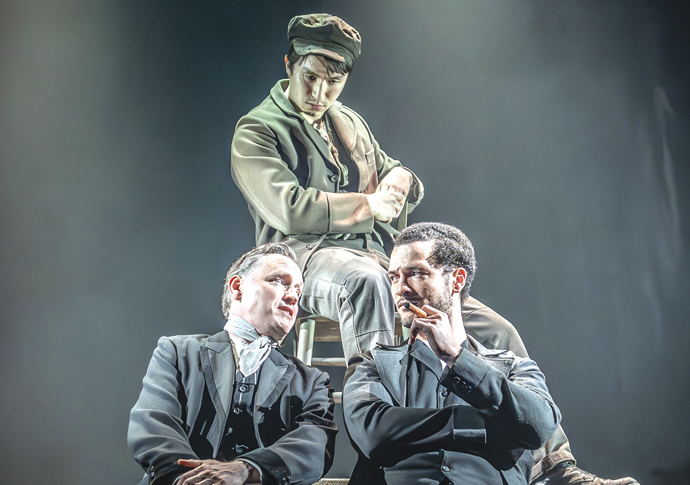Review: London Tide, at Lyttelton, National Theatre
Adaptation of Dickens novel, featuring original songs by PJ Harvey, is imaginatively directed
Thursday, 25th April — By Lucy Popescu

Rufus Wright, Brandon Grace and Jamael Westman in London Tide [Marc Brenner]
THE River Thames is at the heart Ben Power’s adaptation of Charles Dickens’ novel, Our Mutual Friend. A play with original songs by PJ Harvey, London Tide opens with boatman Gaffer Hexam (Jake Wood) pulling a body from the water and emptying the corpse’s pockets.
We learn the dead man is John Harmon, heir to an estranged father who made his fortune from the detritus of London. A condition of John’s inheritance was that he marry Bella Wilfer (Bella Maclean) although they have never met.
Instead, old Harmon’s faithful servant, the kindly Mr Boffin (Peter Wight), becomes the beneficiary.
Bella mourns the loss of her fiancée and his fortune. In Limehouse, Lizzie Hexam (Ami Tredrea) struggles to help her brother Charley (Brandon Grace) break free from their father’s dockside livelihood.
Meanwhile, the enigmatic John Rokesmith (Tom Mothersdale) arrives in London, lodges with the Wilfer family and seeks work with Boffin. Indolent Eugene Wrayburn (Jamael Westman), accompanies his lawyer friend, Mortimer Lightwood (Rufus Wright) to Gaffer’s dockland home, and falls for Lizzie.
London Tide is imaginatively directed by Ian Rickson. Set designer Bunny Christie and Jack Knowles’ evocative use of lighting rigs conveys the tidal movements of the river and a virtuoso trio – Ian Ross, Alex Lupo and Sarah Anderson – accompany Harvey’s songs. The choral numbers work best, although Maclean gives a haunting rendition of Holloway.
Certain minor characters linger with us – particularly Lizzie’s friend, Jenny Wren (Ellie-May Sheridan), a doll-maker, who yearns to rise above her circumstances through “learning”.
Power wisely focuses on the novel’s two love strands, and it’s no mean feat to pare back Dickens to three hours. But the story’s social concerns – inequality, poverty, class and education – and its many plot twists are so heavily signposted, we are denied the pleasure of making the connections ourselves.
Until June 22
nationaltheatre.org.uk